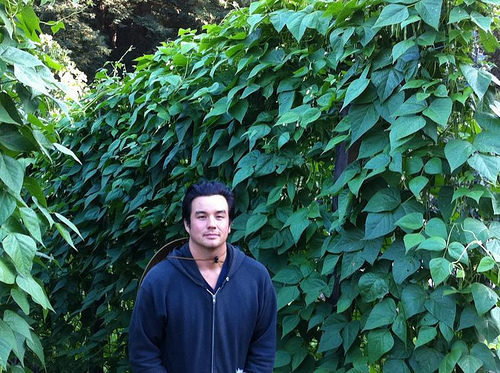
Meet Daniel (Dan) Tran. He and his cohorts at the UC Santa Cruz Center for Agroecology and Sustainable Foods Systems (CASFS) may be your future farmer, landscape designer, chef, or urban renewal leader. A visitor to this website, Dan reached out to me this earlier summer with an invitation to visit and give a talk to CASFS apprentices about my work in food. Of course!, though we had to wait till I finished reviewing the Asian Tofu first pages.
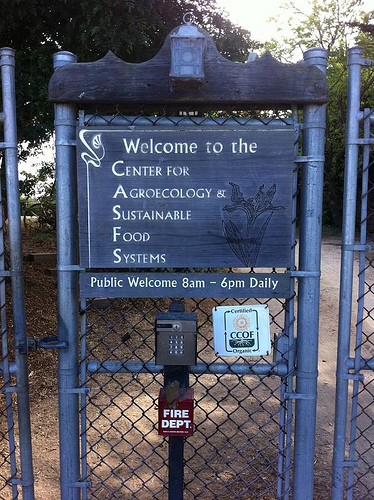
Last Tuesday, on the heels of sending the pages back to editor Melissa Moore at Ten Speed Press, I drove up to the University and met Dan face to face. All I knew up until then was that his family was in the Asian grocery store business in Southern California.
I was intrigued about CASFS (easily said as “cass-fisâ€) because years ago, I worked at UCSC in fundraising and wrote glowing things about the program. Despite my office being close to the 25-acre farm, I never went to see it in person. I knew about it in theory but had never been to the expansive hilltop location with a view of the Pacific.
CASFS is one of the few university programs of its kind to offer practical training on sustainable farming. The apprentices live and work on the premises in a co-op situation. They have rotations (like a doctor would) all over the farms and gardens, sell their harvests, cook for one another, and market their programs.
A little bit of everything. Sound kinda hippie dippie? Well it was born of that era but nowadays, natural living is much more mainstream. These young people are serious about practicing what they’re learning.
Secondly, what was a Vietnamese-American doing on a farm? Japanese American farmers have worked the land for decades and I had met new immigrant farmers of Hmong, Lao and Viet-Chinese descent. Dan was born and educated here. What gives?
Edibles and Ornamentals
That was my first questions to Dan, who explained that he went to college (USC, my alma mater!) for architecture. However, when working on projects such as a large-scale hotel and casino in Vung Tau, Vietnam, he realized that many builders and investors don’t take into consideration sustainability issues. In particular, people didn’t seem to care enough about preserving the land for farming and fisheries. They talked about longevity but it did not pertain to the planet’s resources, he said. Pondering switching careers to sustainable landscape design, Dan applied and won entry into the CASFS program. How did his parents react?
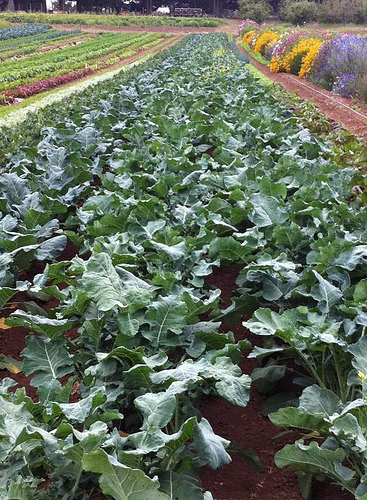
“They said, ‘That sounds interesting,’†Dan told me. Kinda sounds like my parents when I told them I wanted a life of food instead of banking.
CASFS offers training for people interested in ornamentals as well as edibles. One of CASFS’s current teaching assistants, Dan knew the farm and garden well. He took me to the Alan Chadwick garden, a two-acre legendary biodymamic steep plot of land overflowing with densely packed verdant growth. I was bowled over by two 12-foot walls of Romano beans. The photo at the top is of Dan standing between the beans. “This is the kind of thing I’d like to put into a yard,†he said. Totally, an edible fence between neighbors had potential for building community.
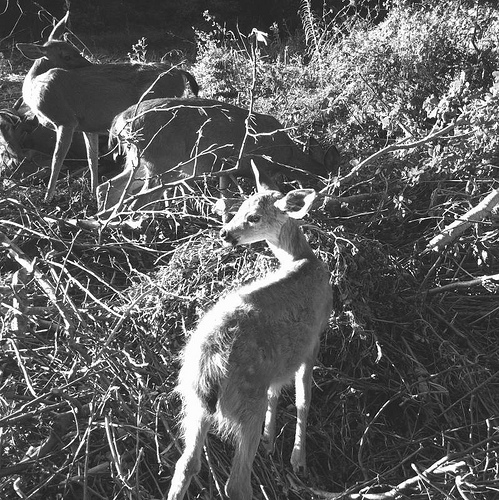
Plus, it was gorgeous. And, on our way out, we spotted a small clan of dozen deer grazing within several feet of my car. Amazing. (The blinding afternoon light is best viewed in grayscale in the photo.)
Experience and Experiment
We then visited the 25-acre farm, where apprentices grow flowers, fruit, and vegetables for a seasonal market cart located at the main University gate, as well as for their CSA (community supported agriculture) program. Along with gorgeous heads of radicchio and other western produce and aromatics, the apprentices also nurture tatsoi, and Indian tulsi (holy) basil, and ginger. There was a vibrant kaffir (makrut) lime tree bearing fruit too. They keep bees for honey, tinker with composting, and try new techniques like stringing up tomato plants to facilitate better grown and air circulation.
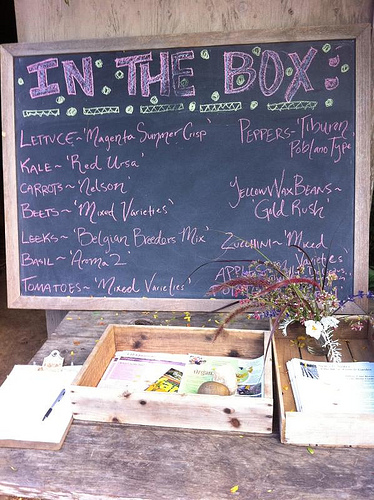
Hannah, another Asian-American apprentice and teaching assistant, showed me a table full of drying yellow onions and another table of dried amaranth plants. There were several kinds and she would be having the apprentices harvest the seeds and thresh them to produce quinoa. When I remarked that it seemed like hard work for the tiny grains, she said, yes it was but it was important for apprentices to do it once themselves to understand the process.
The apprentices were into asexual propagation too. (No, it’s not kinky.) Several of them were harvesting and hunched over short cuttings of various plants, trimming each one purposely and then putting them into small containers of vermiculite and soil. A little leaf had to be kept but the rest had to go, they explained. The apprentices propagated lots of plants in each 4-inch pot because the rate of success was low. Nevertheless, it was a way to grow new plants from successful ones.
As part of my presentation, I brought herbs from my garden and offered tips on how to root each one. The apprentices knew more than I did about the process and they were jazzed about having new plants to tinker with. The next day, Dan reported via email that my cuttings had been promptly asexually propagated!
Driving home, I’d thought of the many experiences I’d had over the years with young people. I used to work in Asian American student services at a university and have given talks to young people at cooking schools and elite institutions like Yale. They often bubbled over with enthusiasm for their bright futures.
At CASFS, there was a similar enthusiasm but it was combined with certain grounded quality. Perhaps it was because these young people worked with the land. For example, Dan wasn’t quite sure about his next move but he pondered all his options. Hannah hoped to return to Philadelphia, her hometown, to work with urban gardening and the Chinese population there. Stephanie, a Taiwanese American, was so deeply engrossed in cultivating her craft that she seemed destined to do amazing things. Filipina-American Aileen aimed to marry her love of foodways, farming, and writing for social justice purposes.
None of these young people talked about making money. There were just really digging what they’re doing, managing their roots in many places and spaces.
Related sites
- CASFS website – get an overview, see the calendar (the Farm to Fork dinner is on 9/11!)
- CASFS blog – keep up on issues and news at the farm and garden
- Kitchen Kwento – a blog of recipes and stories by CASFS apprentice Aileen Suzara













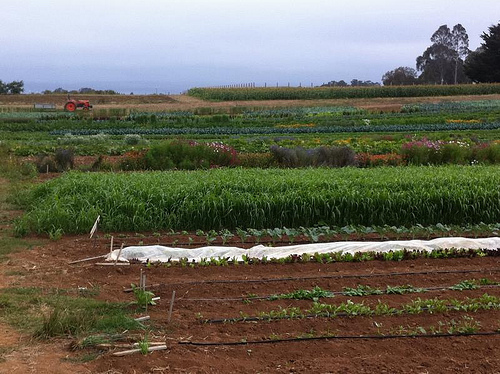



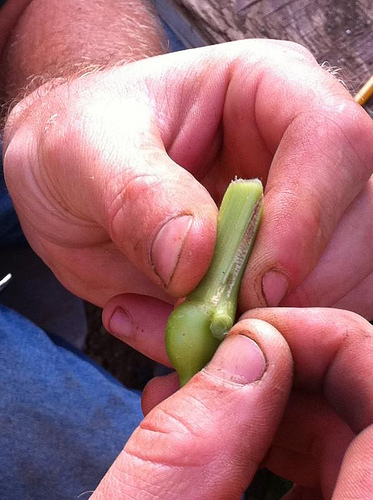



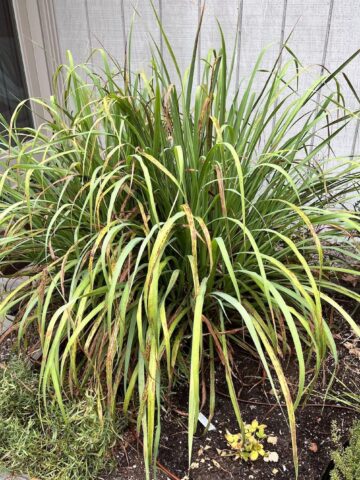
Nate @ House of Annie says
Wonderful story! They are leading the way into the future. I hope to visit this one day.
Andrea Nguyen says
Thanks, Nate. We all need to be more in tune with the land these days.
aileen suzara says
Andrea, thanks for the post and again for your visit to the farm. I/we all enjoyed your multi-sensory presentation on food!
I'm glad you pointed out the "grounded quality" of the folks you met. I'll add that I come from a family history where leaving farming behind - not moving towards it - was seen as a sign of success. So to choose this takes some going against the grain.
I've seen relatively few articles (at least in mainstream ones about the food movement) that highlight POCs let alone APIs in farming, despite our rich legacy as farmers and farmworkers. Thank you for adding one more.
best watches replica says
The study of more than 50,000 adults ages 18 and older provides new molecular evidence that 11 DNA regions in the human genome have strong association with these diseases, including six regions not previously observed.
canada goose says
Towering genius disdains a beaten path. It seeks regions hitherto unexplored.
ime and tide wait for no man.
come on!!!!
Agoniirrido says
vKvgNtkZl chicago bears jerseys xCumIknSi http://uggsbootsforcheap1222.putblog.org/2011/12/22/miami-dolphins-jersey/
Berbedgecib says
KQCJABBGIA canada goose IAGKWJABJZ http://wallinside.com/post-981669.html
Beats by Dr Dre says
\But even the most cynical secretly admit that success exists; that achievement counts for a great deal; and that the true myth is that the actions of men and women are useless. To believe otherwise is to take on a point of view that is likely to be deranging. It is, in its implications, to remove all motives for competence, interest in attainment, and regard for posterity.
Beats by Dr Dre says
When one loves one’s art, no service seems too hard.
canada goose parka says
In the world the most exhausting matter is that spending every day falsely.
cong ty seo says
On farms and in backyards, more Asian Americans are shunning chemicals and pesticides in favor of going green.
Peaches from the Masumoto Family Farm awaken the worst kind of food lust, especially the heirloom peaches, a yellow flesh varietal that’s softer, juicier and fuzzier than the kind often found in supermarkets.
“They’re not the trophy wives of peaches,” said David Mas Masumoto about the deceptive appearance of the heirloom peaches grown in his orchard near Fresno, Calif. “When you lick your lips after eating a peach you can still taste it.”
Masumoto, a third generation farmer and Fresno JACL member who specializes in environmentally responsible farming, is part of a growing wave of Asian Pacific American organic farmers — for both large-scale and backyard productions — who are abandoning the use of chemicals and pesticides in favor of more “green” techniques.
cooking grill says
Wonderful story! They are leading the way into the future.